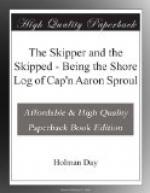“Our s’leckman can outtalk him three to one,” confided one of the Smyrna supporters to Constable Nute. “I never heard deep-water cussin’ before, with all the trimmin’s. Old Trufant ain’t got northin’ but side-hill conversation, and I reckon he’s about run down.”
Constable Nute should have awaited more fitting opportunity, but Constable Nute was a rather direct and one-ideaed person. As manager of the town hall he had business to transact with the first selectman, and he proceeded to transact it.
“Mister S’leckman,” he shouted, “I want to introduce you to Perfessor—Perfessor—I ain’t got your name yit so I can speak it,” he said, turning to his passenger.
“Professor Derolli,” prompted the passenger, flicking his cigarette ash.
Cap’n Sproul merely shot one red glance over his shoulder, and then proceeded with his arraignment of Vienna in general—mentally, morally, socially, politically, and commercially.
“The perfessor,” bawled Constable Nute, unable to get his team very near the selectman on account of the upheaved condition of the road, “has jest arranged with me to hire the town hall for a week, and he wants to arrange with the selectmen to borrow the use of the graveyard for a day or so.”
The constable’s vociferousness put the Cap’n out of voice, and he whirled to find that his auditors had lost all interest in the road dispute, and naturally, too.
“To borrow the use of the graveyard, said privilege bein’ throwed in, considerin’ that he hires the town hall for a week,” repeated the constable.
Cap’n Sproul hated cigarettes; and he hated slim, pale young men who dressed foppishly, classing all such under the general term “dude.” The combination of the two, attending the interruption of his absorbing business of the moment, put a wire edge on his temper.
“Graveyard! Yes!” he roared. “I’ll appoint his funeral for two o’clock this afternoon, and I’ll guarantee to have the corpse ready.”
“In transactin’ business it ain’t no time for jokin’,” protested the direct Mr. Nute.
“There’s no joke to it,” returned the Cap’n, viciously, seizing a pickaxe.
“It ain’t much of a way for a first selectman of a town to act in public,” persisted Constable Nute, “when town business is put before him.”
That remark and a supercilious glance from the professor through his cigarette smoke brought the Cap’n on the trot to the side of the wagon.
“I’m ‘tendin’ to town business—don’t you forget that! And I’m ‘tendin’ to it so close that I ain’t got time to waste on any cheap peep-show critters. Don’t want ’em in town. Clear out!”
“I’ll make you sorry for insulting a gentleman,” the professor threatened.
“Clear out!” insisted the Cap’n. “You ain’t got any right drivin’ onto this road. It ain’t been opened to travel—”
“And it looks as though it never would be,” remarked Constable Nute, sarcastically; but, daunted by the glare in the Cap’n’s eyes, he began to turn his horse. “I want you to understand, S’leckman Sproul, that there are two other s’leckmen in this town, and you can’t run everything, even if you’ve started in to do it.”




